Are science and religion opposites?
Posted by Josh Taylor / February 4, 2019
The New York Times just published an opinion piece called “What Science Can Learn From Religion.” It’s a nice piece. It opens by acknowledging the divide between science and religion:
Science and religion seem to be getting ever more tribal in their mutual recriminations, at least among hard-line advocates. While fundamentalist faiths cast science as a misguided or even malicious source of information, polemicizing scientists argue that religion isn’t just wrong or meaningless but also dangerous.
The author then places himself in the debate. He’s a psychologist, and he asserts that the “scientific method provides the best tools with which to unlock the secrets of human nature.” He has used the scientific method to test religious postulations with his clients. Sometimes, he says, religion is helpful and other times it isn’t. Helpful things include meditation and other rituals, which have various benefits for humans. The author concludes science and religion can help each other. Cool.
But there’s a glaring problem with this opinion piece: it assumes that there is an inherent separation between science and religion. The thing is, there is no inherent separation between science and religion! An excellent historian of science, Jon H. Roberts, has done a lot of work deconstructing the myth of the separation between science and religion. In one article, he called it “The Idea that Wouldn’t Die.” In that article, he describes the long history of science’s connection to religion, not separation from it. But he does describe when the idea that the two were somehow opposite ends of a spectrum or separate spheres of reality.
That raises a new question: what do we do with the historical fact that science and religion have not been fundamentally opposed and in reality are connected, but the simultaneous knowledge many people (if not most people) believe that the separation is real and that science and religion are incompatible?
While it may be impossible to convince people that science and religion don’t have to be opposed, Jordan Peterson is doing a decent job of convincing skeptics that religion and science are, in fact, compatible. By combining evolutionary biology with an impressive knowledge of myth, Peterson weaves together a worldview that makes sense to modern people. Part science, part religion, it helps people make sense of the world.
For the more intellectually adventurous, it’s worth wondering whether the separation of religion and science is a false dichotomy. If you define religion as the belief in the supernatural, then of course the two things are going to conflict. But that’s a childish definition of religion, and it lacks any sophistication. If we define religion instead as a comprehensive means of making sense of the world, then the question becomes why wouldn’t science and religion be compatible? Further, if we remember that science is not an ideology––that is, not a method of understanding all aspects of life through a single lens––then we remember that science provides only a certain kind of truth, and we also remember that there are multiple kinds of truths. We’ll dig into this more in a later post.
More about religion.
Comments are off for this post.